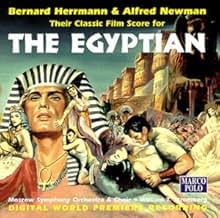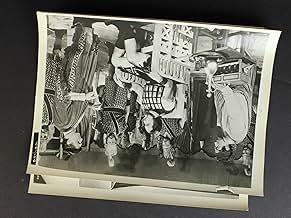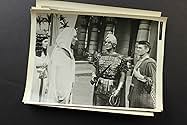No antigo Egito, um órfão pobre torna-se um médico genial e acaba sendo nomeado para a corte do Faraó, onde testemunha intrigas e aprende perigosos segredos reais.No antigo Egito, um órfão pobre torna-se um médico genial e acaba sendo nomeado para a corte do Faraó, onde testemunha intrigas e aprende perigosos segredos reais.No antigo Egito, um órfão pobre torna-se um médico genial e acaba sendo nomeado para a corte do Faraó, onde testemunha intrigas e aprende perigosos segredos reais.
- Indicado a 1 Oscar
- 1 vitória e 1 indicação no total
Enredo
Você sabia?
- CuriosidadesOne of the few Hollywood "spectacles" in which top billing went to a woman: Jean Simmons.
- Erros de gravaçãoAkhnaton was succeeded by Tutankhamen, not Horemheb. Horemheb succeeded Aye, who was the successor of Tutankhamen.
- Citações
Nefer: No. I brought you here only to show you the gate in my garden wall. Later, when all of my guests have gone... I will be here by my lotus pool.
Sinuhe: Why do you tell me this?
Nefer: Perhaps because I am fond of gifts, and the greatest gift any man can bring to a woman is his innocence, which he can give only once.
- Cenas durante ou pós-créditosThe 20th Century Fox logo plays without the usual fanfare.
- Versões alternativasThe version of the film shown in the UK was shorter than the standard print by several seconds. Missing and apparently censored were the two shots of Nefer's head underwater as Sinuhe is attempting to kill her.
- ConexõesEdited into Ancient Secrets of the Bible (1992)
Strange! Archaeological! Decadent! It is as if we are descending into some vault of antiquity, wherein might be great treasures, mixed with uncertain hazards. (One might imagine Darryl Zanuck commanding: 'Make it ancient!') Then, what a darkly dramatic story unfolds, all within the same tone set at the start.
Of Hollywood's mid-50s 'Egyptian Trilogy', 'The Ten Commandments' portrayed the civilization's sternness, the phenomenal 'Land of the Pharaohs' its nuts and bolts, while 'The Egyptian' shows it all, from glamour to tragedy, for us to wonder at.
No need to say much about the players here, but I think that, with the passage of time, Bella Darvi is being redeemed. What a perfect face for the role, right out of a Symbolist painting. If her acting does not please some, it might be argued that, in her role as a 'courtesan', she is obviously better in bed than yakking to some poor helpless admirer. I think that Curtiz captured the kinkiness of her sado-masochistic relationship with Edmund Purdom's character with aplomb, censorship being what it was at the time. Sir Peter Ustinov, in his memoirs, was pretty kind to 'The Egyptian', writing that it was 'like being lost in a huge set for 'Aida'. His pronunciation of the word 'beer' I have adopted myself ever after.(One of the film's historically accurate references: the Egyptian's invented beer!) Henry Daniell, egads, what a perfect performance. Gene Tierney, what a screen treasure. Bless DFZ for giving her this 'late' role. C'mon folks, don't be so hard on Victor Mature! He's a cheesemaker's son! Who rose to be pharaoh! Sounds like a peculiarly American opportunity. One of the best moments: John Carradine's existential observations on the sands of time. And Purdom's utterance about dwelling beyond the sunset of the world. If that isn't Grade 'A' epicness, what is?
Of course, along with everything else, the music is sublime. It is frequently noted that Alfred Newman and Bernard Herrmann created one of the screen's most compelling scores, perfectly harmonious, yet each theme is well developed, with a life of its own. Newman, pressed for time by DFZ, called in Herrmann, someone he could trust implicitly, to take up half the burden.
Benny, not the easiest guy to work with, obviously respected Newman enough to really deliver inspiring music. They alternated cues, an ingenious approach. No spoilers as to who did what here, but Benny brings an edge with him, mysterious, awesome sounds. Alfred brings fulsomeness, longing, poignancy. Both are consummately epic. Even when seen on a squeezed TV print, the effect of seeing the two composers' names side by side in the main credits, which the ultra-wide anamorphic screen could comfortably accommodate, is spine-tingling.
Leon Shamroy, the Dean of CinemaScope, does not let us down here. The lurid greens and moody shadows (probably distortions in all the terrible TV prints I've seen through the years) perfectly accompany the multi-dimensional script (by the great Philip Dunne and WB vet Casey Robinson, whom Curtiz must've brought with him to 20th). How remarkable it is that Shamroy, who was as much of an institution of cinematography at Fox as Newman was with music, would lens 'Cleopatra' a few years later, but in the brighter, sharper images of '60s Todd A-O. These old studio guys are really heroes of mine.
To me, who wants to fret about all the imperfections and criticism opportunities in a picture like this? I'd rather yield entirely to its spell, and dive off into its sea of lavishness, to emerge after the inspiring climax of 'The End' refreshed, moved, and hungry for more.
And yes, we should cry out to 20th-Fox for a DVD release worthy of DFZ's legacy.
- Gooper
- 22 de ago. de 2004
- Link permanente
Principais escolhas
Detalhes
Bilheteria
- Orçamento
- US$ 5.000.000 (estimativa)
- Tempo de duração2 horas 19 minutos
- Cor
- Proporção
- 2.55 : 1
Contribua para esta página







































